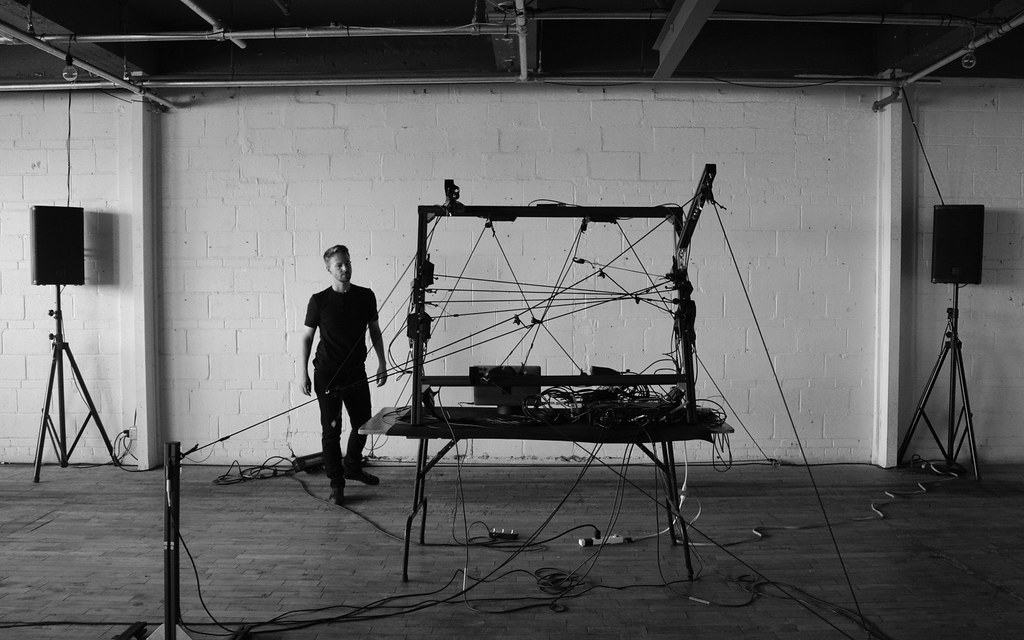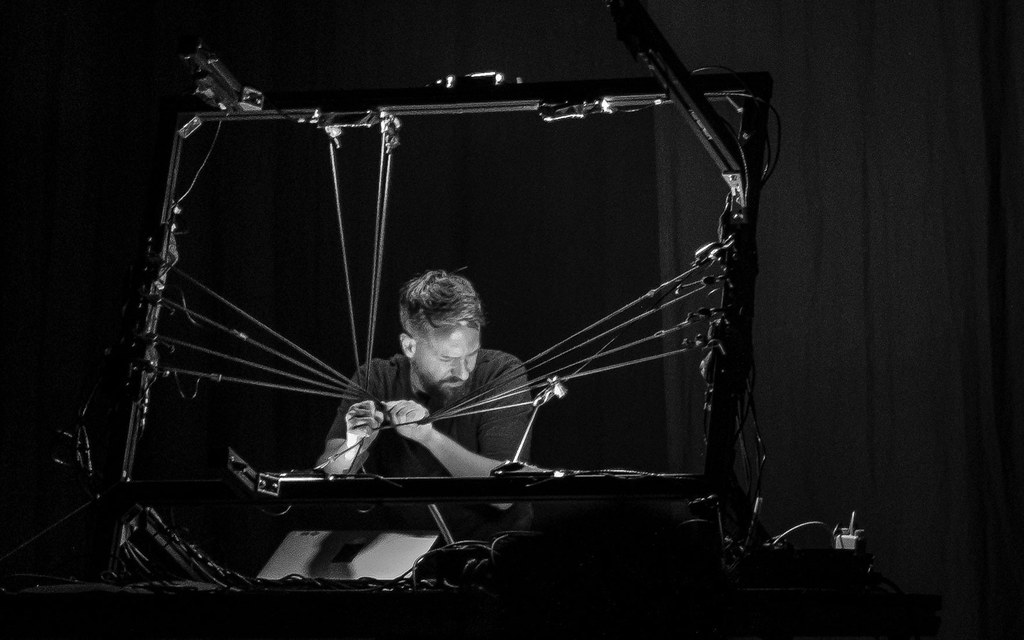String Network // Alexis Langevin-Tétrault

Photo by Myriam Boucher.
Interférences is a tangled mesh of hooks, elasticated webbing and personal attachments. The contraption was originally developed by Alexis Langevin-Tétrault, in an attempt to introduce some physicality to performing electronic music, equating its increasingly untamable web of cords to the metaphor of an online social network. As it grows beyond the borders of its owners expectations and intentions, it becomes increasingly difficult to control and make sense of.
The project took on an additional significance for Tétrault as he was building it however. Upon falling ill with an at the time undiagnosed health problem, Tétrault channeled his experiences in hospital labs, being tested and run through scanners into the project, coming to view it as a form of catharsis in which he is able to relive this period, coming out the other side stronger and more resilient than ever.
Previously, he has released prolifically under the alias Alexeï Kawolski, putting together a multitude of works focused on the sweet spot between ambient, glitch and outright noise. The results wouldn't sound out of place on a label like Ad Noiseam or Kvitnu, yet Tétrault has been happy to self-release these works, giving him the freedom to present them exactly as he wishes.
We caught up with him after a recent visit to Athens to discuss the origins of Interférences, Montreal's music culture and his family's background in instrument making.
You recently got back from the Athens Digital Arts Festival where you were performing with Interférences. What's it like to travel with?
It's not that bad because when I built the device I had in mind that I have to be able to fly with it. Everything can be taken apart into fairly small pieces and put into a regular suitcase. It's not over the size or weight limit so everything is OK, and it doesn't cost a lot! I don't have problems with security too much - I have to explain what it is but they always let me in. Only in the U.S. is it harder to get in with that kind of stuff - they're more stressed about it [laughs].
Last year I was in New York which is really close to where I live, but it was still really complicated. It took like a day of day of people screaming at me and putting on a big show to impress me or something. In the end it was OK. I was coming from France and they didn't really understand what I was doing with that device. They said we know it's not dangerous, but we don't know if you're coming with someone else and maybe there's another part of the device. You could build a transformer or something that could destroy the city [laughs].
I can sympathise with that. When I saw Interférences I thought it might be a device to destroy the world. Can you tell me a bit about the history of it and how you came to build it?
15 years ago I was mainly a guitarist, but my passion was to make weird sounds you don't usually make with a guitar. A lot of pedal effects and DIY stuff. At some point I gave it up and started to play with a modular synth and a computer. At that point I stopped doing shows and was working in the studio much more. I missed going on stage and doing something physical, so that was the starting point of creating something with which I could interact and put on a show using my physicality, not just hiding behind a computer.
I come from a family who build string instruments; violins and things like that. Both my grandfather and my great great grandfather did that, so the idea of putting like a digital string instrument together seemed coherent with my family history.
"The nature of the device means I react differently every time I play it."
There's different layers of meaning in that performance. I'm building a network with those cables which is increasingly complex. I can create sound but at the same time it becomes harder for me to keep control of everything. More and more it becomes a fight against the machine.
Maybe the more personal layer of meaning is that when I was starting to create the musical and visual content for this show I started to feel sick. Everything is fine now, but at that point I didn't know what I had. I started to have side effects which were giving me electric shocks and stuff - it was really really bad. I didn't know what was going to happen and I had to go for lots of scans and things like that. That really inspired me when I was creating Interférences. It ended up being like a primal scream to say I am going to fight against whatever, until the end. All the weird sounds you hear in the show are close to what I was hearing in the machines I was being scanned in.
Didn't that experience make you want to do the opposite though - get away from hearing those kind of sounds? Part of me would think you'd just want to pick up a Ukulele or something.
[Laughs] At that point it was a way to deal with it and to have some sort of control over it.
Does it feel cathartic?
Yeah, for me the show really is catharsis. Absolutely. Each time I do this performance I try to focus on that state of mind and do something sincere. It's not fake what I'm doing - the intensity is real and I'm giving all I can. Each time I do it, it's like I pass through this process but at the end I'm still and alive and I've won! So for me it's a catharsis and it's uplifting.
The next project I do will probably focus on a different energy. Something much quieter, trying to do the opposite...
There's a slight political metaphor to the concept as well right?
It's there at some point but I try not to be really in your face about it. I like people to make sense of what they see and make their own story. Years ago, when I did my first degree in sociology, people were much more critical of technology. It was the beginning of social networking about 12 or 13 years ago, so we were really studying that and trying to understand all the social dynamics that would create all of that.
At a conceptual level it's about working with networks that allow you to create something, but at the same time it becomes like a jail. You lose a little bit of freedom in what you are doing. You lose control over it. There's that aspect but you can also see the show and not think about that.

Photo by Curt Lundberg.
I noted with your Alexeï Kawolski projects there was a political link to, writing an EP in response to Trump's election. I was wondering how much politics influences your work and your thinking generally.
Kawolski is really inspired by politics. It's a side project where I can create a lot in a short period of time. It's another form of catharsis. Almost all of the things I did with this project are inspired by political events going on around me. Usually it's something that's upset me or made me feel like I need to do something, but there's nothing I can do. It's a way to canalise all the anger or the sadness of things.
Things are really weird in the U.S. and I'm not a fan of Trump at all. I needed to do something about it. I used to be involved in a big student movement in Canada, mainly fighting for school fees but asking for a big change in society in general. That kind of experience really influenced me. It affected me, so I thought I'd put it into music.
You mentioned that after Interférences you will probably move on and do something totally different. Your projects seem to be very separate from one another.
Maybe it's not a good business plan to work like this but it's not how I think or who I am. I think it's a great aspect of being an artist that you can reinvent yourself and change direction. I really like to go out of my comfort zone. When I feel like I know what I'm doing too much, it stops being fun. Interférences is great because the nature of the device means I react differently every time I play it. I'm always a bit out of my comfort zone.
What is the link with Mutek too?
Well Mutek is really big in Canada and probably the main event in the year. I've known them for a while. At first they contacted me about Kowalski about four or five years ago. It's a relationship we've built over the years. They seem to really like Interférences and have been helping me book shows around the world. They know everyone and have partnerships with pre-existing festivals. They like people doing things outside the mainstream.
How do you find Montreal as a city generally? Is it somewhere you're just studying or do you see a home as well?
Montreal is where I want to be right now. It's great because it's big enough that there's always events going on but it's not so big that you get lost and don't know anybody, like you do in some cities. It's a really creative place to be. It's kind of the joke in Montreal that everyone is an artist - everyone is in a band or has their own project. There's so many people feeding you with creative ideas and so many venues dedicated to artistic things and digital art. Mutek is based there and there's also Elektra, which is kind of a smaller Mutek. It's a great place to be right now and the cost of living isn't too bad...
I don't know if I will stay here all my life but for the following years I see myself in Montreal.
When you say everyone is an artist in Montreal, does that same distinction apply to France?
It's not the same in France, everyone has a big knowledge of art and everyone can talk about, it but I'm not sure everyone is an artist there.
... Everyone's a critic?
[Laughs] Yeah. The state of the art in France - it's maybe more conservative there what they're doing. There's digital arts too but it's only just started to be explored. It's something quite new for them. In Montreal, there's been a really big scene for more than 15 years now. It's not just dance music but really edgy things. I don't see myself living in Paris right now - it's somewhere I go for work but that's it.
Even aside from electronic music, Canada has produced some amazing bands too.
For sure, there's some help from the government too if you want funding to travel or something. I guess there's money in art there which helps artists create new things. The government in Canada give you just enough funding so you can do what you want to do, but it's not that much that you don't feel you have to do anything... It's just enough that you can do what you need to do to present your project in front of people. The help is there - if you're really looking for it, you'll find it.
- Published
- Jun 12, 2018
- Credits
- Words by Theo Darton-Moore
